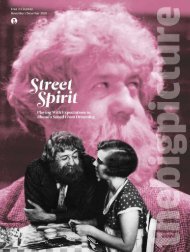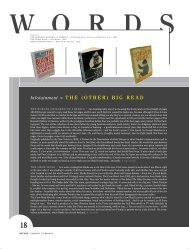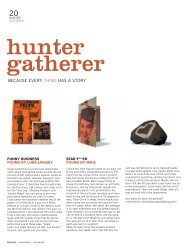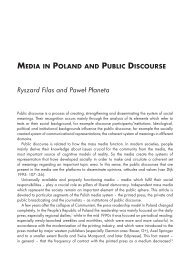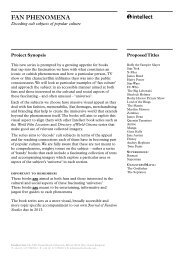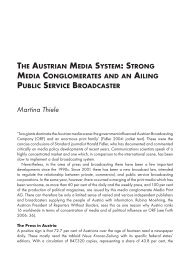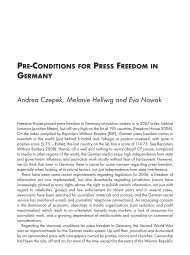Anthem - Intellect
Anthem - Intellect
Anthem - Intellect
Create successful ePaper yourself
Turn your PDF publications into a flip-book with our unique Google optimized e-Paper software.
Signifying Europe<br />
The mode then becomes one of a carnivalesque parade, a mocking<br />
spectacle—critics have even compared the sounds of the bassoons<br />
and bass drum that accompany the beginning of the marcia turca to<br />
flatulence. After this point, such critics feel, everything goes wrong,<br />
the simple solemn dignity of the first part of the movement is never<br />
recovered.<br />
But what if these critics are only partly correct—what if things do<br />
not go wrong only with the entrance of the marcia turca? What if<br />
they go wrong from the very beginning? Perhaps one should accept<br />
that there is something of an insipid fake in the very ‘Ode to Joy’, so<br />
that the chaos that enters after Bar 331 is a kind of the ‘return of the<br />
repressed’, a symptom of what was errant from the beginning.<br />
If this is the case, we should thus shift the entire perspective and<br />
perceive the marcia as a return to normality that cuts short the<br />
display of preposterous portentousness of what precedes it—it is the<br />
moment the music brings us back to earth, as if saying: ‘You want to<br />
celebrate the brotherhood of men? Here they are, the real humanity’.<br />
And does the same not hold for Europe today? The second stanza<br />
of Friedrich Schiller’s poem that is set to the music in ‘Ode to Joy’,<br />
coming on the heels of a chorus that invites the world’s ‘millions’<br />
to ‘be embraced’, ominously ends: ‘But he who cannot rejoice, let<br />
him steal weeping away.’ With this in mind, one recent paradox<br />
of the marcia turca is difficult to miss: as Europe makes the final<br />
adjustments to its continental solidarity in Lisbon, the Turks, despite<br />
their hopes, are outside the embrace.<br />
So, when in the forthcoming days we hear again and again the<br />
‘Ode to Joy’, it would be appropriate to remember what comes after<br />
this triumphant melody. Before succumbing to the warm sentiment<br />
of how we are all one big family, I think my fellow Europeans should<br />
spare a thought for all those who cannot rejoice with us, all those<br />
who are forced to ‘steal weeping away’. It is, perhaps, the only way<br />
we’ll put an end to the rioting and car burnings and other forms of<br />
the Turkish march we now see in our very own cities. 393<br />
Žižek thus links Beethoven’s composition to an argument about contemporary<br />
obstacles for unifying Europe, particularly on its eastern border:<br />
The main sign of today’s crisis of the European Union is precisely<br />
Turkey: According to most of the polls, the main reason of those who<br />
voted ‘no’ at the last referendums in France and Netherlands was<br />
170



